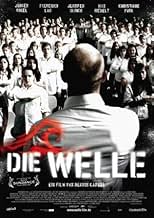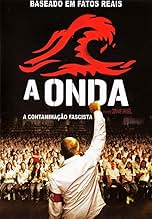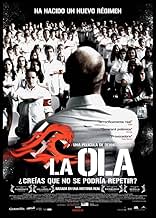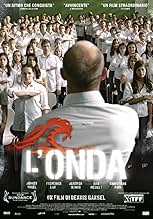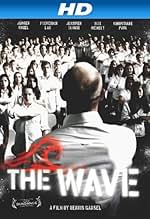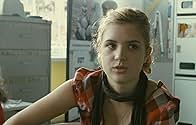A high school teacher's experiment to demonstrate to his students what life is like under a dictatorship spins horribly out of control when he forms a social unit with a life of its own.A high school teacher's experiment to demonstrate to his students what life is like under a dictatorship spins horribly out of control when he forms a social unit with a life of its own.A high school teacher's experiment to demonstrate to his students what life is like under a dictatorship spins horribly out of control when he forms a social unit with a life of its own.
- Awards
- 9 wins & 8 nominations total
Featured reviews
Die Welle (The Wave) is truly a brilliant tale that lures viewers into its cleverly developed plot just as Herr Wenger lures his unsuspecting students into a sense of fascism. When Wenger, an affable schoolteacher who seems to be rebellious towards traditional instruction, gets selected to teach a class on autocracy, he is upset. However, he soon devises a plan with which to teach the students a valuable lesson on the sheer dangers of fascism and the ease with which one can be lured into it.
His class starts out simple and nonthreatening. The students choose Wenger as their leader and are instructed to wear a uniform and create a name for themselves (the students choose Die Welle "The Wave"). But, this club slowly turns into a sort of fascist regime. The unsuspecting students think they are participating in some sort of fun club, but they are really being shown how easily impressionable people can be attracted by autocracy.
The biting irony of this film is that at the beginning of the autocracy class, Wenger touched on the subject of Hitler's reign, and the students almost instinctively spit out answers about how Germany would never fall into that trap again knowing what they know now. But, the children soon eat their words when they become members of a much less disturbing, yet frighteningly similar clique.
There is a glimmer of this fact when two students who aren't members of "The Wave" pick on a student who is. Two other members come to the rescue of the victim. Though many may view this as a positive aspect of this sort of togetherness, the point is that fascism has developed and can easily become corrupt.
I highly recommend this to any potential viewer who either holds the same views as the students at the beginning of the film or simply wants to be entertained by the ironic theme of the film (so long as you don't mind the subtitles).
His class starts out simple and nonthreatening. The students choose Wenger as their leader and are instructed to wear a uniform and create a name for themselves (the students choose Die Welle "The Wave"). But, this club slowly turns into a sort of fascist regime. The unsuspecting students think they are participating in some sort of fun club, but they are really being shown how easily impressionable people can be attracted by autocracy.
The biting irony of this film is that at the beginning of the autocracy class, Wenger touched on the subject of Hitler's reign, and the students almost instinctively spit out answers about how Germany would never fall into that trap again knowing what they know now. But, the children soon eat their words when they become members of a much less disturbing, yet frighteningly similar clique.
There is a glimmer of this fact when two students who aren't members of "The Wave" pick on a student who is. Two other members come to the rescue of the victim. Though many may view this as a positive aspect of this sort of togetherness, the point is that fascism has developed and can easily become corrupt.
I highly recommend this to any potential viewer who either holds the same views as the students at the beginning of the film or simply wants to be entertained by the ironic theme of the film (so long as you don't mind the subtitles).
This is a German film (subtitled) about a school project looking at autocracy (a la Nazi Germany). In order for the teacher to persuade his pupils that autocracy remains a real threat to democracy, he persuades them to take part in a class dictatorship. The key difference between this and your average school classroom is that he convinces the pupils not just to obey but also to want his every command. Of course the project turns bad and things get scary.
What I liked about the film was that it did not treat the pupils as "just kids"; they had brains, opinions, and their own ethics too. It is not a very black and white in it's opinion, you could draw some distinct opinion from the film but I suggest that there are several different opinions that are equally as valid. It keeps you guessing what is going to happen & even deliberately misleads you.
What I liked about the film was that it did not treat the pupils as "just kids"; they had brains, opinions, and their own ethics too. It is not a very black and white in it's opinion, you could draw some distinct opinion from the film but I suggest that there are several different opinions that are equally as valid. It keeps you guessing what is going to happen & even deliberately misleads you.
How does anyone really portray autocracy and/or fascism? In most ways, it can be done in the usual one-dimensional concoction of corruption, evil deeds, extreme delusion and paranoia amongst the ruling elites of the regimes. The Wave ("Die Welle") though looks at the issue from a different angle, examining how it can arise and entrance those it touches, and in the process makes the whole issue look fresh again.
The basic story is that of a school teacher (an anarchist at heart) who has to teach a class about "Autocracy". Failing to get their attention, he decides to create an experiment whereby they are to create their own mini autocracy and rules amongst themselves (named "The Wave"). With such a controversial subject, the whole thing gets out of hand with the pupils succumbing to the autocratic fascist methodology with grave consequences.
One important point that needs to be added is that its a German movie, and for historical reasons the topic is a delicate one, yet seems to add to the whole feel. The film is quite realistically disturbing in many ways, and shows how most of the pupils slowly fall for fascism in quite innocent ways. It will make you think and possibly reassess the important question, as asked in the film, if Autocracy can rear its head again.
The writing, the acting and direction are excellent. Jürgen Vogel as the class teacher is both entertaining and thoughtful in his role, but the cast in general is exceptional especially as in the main they are mostly teenagers.
If you like thoughtful films, and wish to see something that is questioning historical events in the present, then there is little to better this. Deserves to be watched. Its a film that will definitely be spoken about and re watched by many repeatedly for many years to come.
The basic story is that of a school teacher (an anarchist at heart) who has to teach a class about "Autocracy". Failing to get their attention, he decides to create an experiment whereby they are to create their own mini autocracy and rules amongst themselves (named "The Wave"). With such a controversial subject, the whole thing gets out of hand with the pupils succumbing to the autocratic fascist methodology with grave consequences.
One important point that needs to be added is that its a German movie, and for historical reasons the topic is a delicate one, yet seems to add to the whole feel. The film is quite realistically disturbing in many ways, and shows how most of the pupils slowly fall for fascism in quite innocent ways. It will make you think and possibly reassess the important question, as asked in the film, if Autocracy can rear its head again.
The writing, the acting and direction are excellent. Jürgen Vogel as the class teacher is both entertaining and thoughtful in his role, but the cast in general is exceptional especially as in the main they are mostly teenagers.
If you like thoughtful films, and wish to see something that is questioning historical events in the present, then there is little to better this. Deserves to be watched. Its a film that will definitely be spoken about and re watched by many repeatedly for many years to come.
That's what the title "Die Welle" means. A teacher makes an experiment. He wants his class to understand what autocracy means. It starts with them stopping calling him by first name. Then they have to rise while addressed. Then, there are uniforms and a special saluting. And then, it runs out of control.
The most disturbing thing is that the teacher slowly loses control over himself, until there is a disaster.
OK, does it take a week to form young people to fascists? That's not the point. How ever long it takes, the interesting answer here is that it is possible at all. Do we run that risk too? Well, if you look into yourself, you maybe won't find a fascist, but you'll probably find someone who wants to be a part of something. Whatever it is.
The most disturbing thing is that the teacher slowly loses control over himself, until there is a disaster.
OK, does it take a week to form young people to fascists? That's not the point. How ever long it takes, the interesting answer here is that it is possible at all. Do we run that risk too? Well, if you look into yourself, you maybe won't find a fascist, but you'll probably find someone who wants to be a part of something. Whatever it is.
Die Welle details how a project on autocracy gradually leads to disastrous results. Initially without enthusiasm to teach the topic, Rainer Wegner conducts an unorthodox experiment to demonstrate to his students (equally lukewarm to start with) what life would be like under fascism. Neatly structured by days, the experiment begins with simple disciplines and grows to become an exclusive cult named "the wave" with its own uniform and salute.
Similar to his 2004 film "Before the Fall" which concerns the Nazi's seduction of youth, Dennis Gansel probes the individual psychologies that bring about uncontrollable collective movement, and how personal life is transformed by it. It offers a balanced view on an organisation like "The Wave" by enquiring whether it is a crystallisation of the students' class-free utopia (at the cost of losing individuality) or a community for those in need of belonging and empowerment.
What is frightening is that many (though not all) of them voluntarily follow the conformity through reasoning. Ironically, the mob mentality engulfing the students is what they condemn formerly; even the "anarchist" Rainer finds himself intoxicated with his increasingly idolised status.
An engaging and powerful film with a sense of humour, suspension (terror arises when the light goes off during Karo's anti-Wave poster distribution), twist (Rainer's concluding speech), believable characterisation and excellent acting (Jürgen Vogel, Max Riemelt, and Frederick Lau). Inspired by a true event in California , this intelligent film merits attention particularly because of its non-preaching and humanistic treatment of a heavy subject.
Similar to his 2004 film "Before the Fall" which concerns the Nazi's seduction of youth, Dennis Gansel probes the individual psychologies that bring about uncontrollable collective movement, and how personal life is transformed by it. It offers a balanced view on an organisation like "The Wave" by enquiring whether it is a crystallisation of the students' class-free utopia (at the cost of losing individuality) or a community for those in need of belonging and empowerment.
What is frightening is that many (though not all) of them voluntarily follow the conformity through reasoning. Ironically, the mob mentality engulfing the students is what they condemn formerly; even the "anarchist" Rainer finds himself intoxicated with his increasingly idolised status.
An engaging and powerful film with a sense of humour, suspension (terror arises when the light goes off during Karo's anti-Wave poster distribution), twist (Rainer's concluding speech), believable characterisation and excellent acting (Jürgen Vogel, Max Riemelt, and Frederick Lau). Inspired by a true event in California , this intelligent film merits attention particularly because of its non-preaching and humanistic treatment of a heavy subject.
Did you know
- TriviaBased on the novel "The Wave" by Todd Strasser (under the pen name Morton Rhue), a fictionalized account of the "Third Wave" teaching experiment by Ron Jones that took place in a Cubberley High School history class in Palo Alto, California in April 1967.
- GoofsAlthough set somewhere in western Germany, all policemen wear insignia of the state of Berlin.
- Quotes
Rainer Wenger: So you don't think there could be another dictatorship in Germany?
Jens: No, we are too enlightened now.
- Crazy creditsOpening and closing credits appear as graffiti.
- ConnectionsFeatured in Die Johannes B. Kerner Show: Episode dated 12 March 2008 (2008)
- SoundtracksRock 'n' Roll High School
Written by Joey Ramone, Johnny Ramone and Dee Dee Ramone
Performed by EL*KE
Produced by Mirko Schaffer
©1980 WB Music Corp. and Taco Tunes
- How long is The Wave?Powered by Alexa
Details
Box office
- Budget
- €5,000,000 (estimated)
- Gross worldwide
- $32,350,637
- Runtime1 hour 47 minutes
- Color
- Sound mix
- Aspect ratio
- 2.35 : 1
Contribute to this page
Suggest an edit or add missing content





